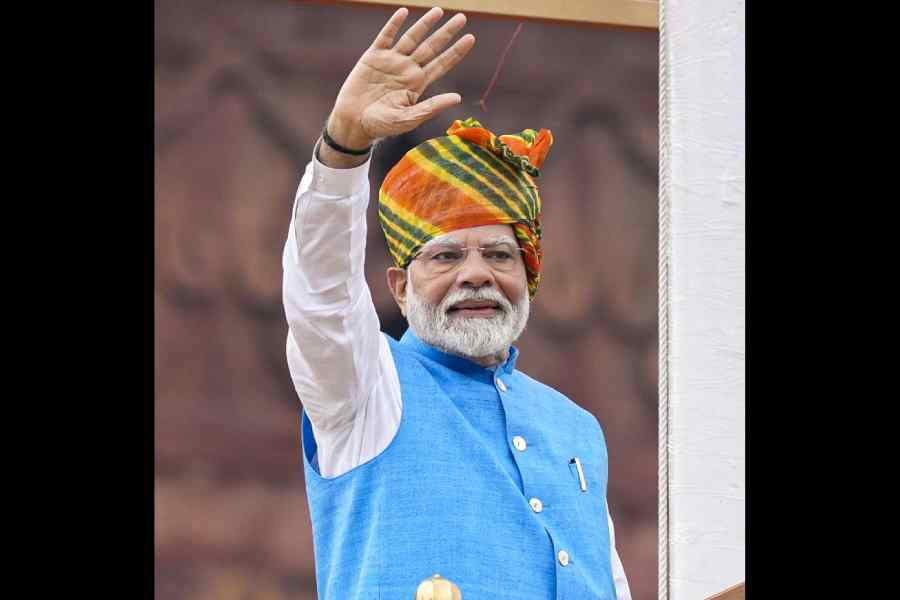Prime Minister Narendra Modi on Thursday described the country’s existing civil laws as “communal” and advocated a “secular civil code”, pushing a core BJP agenda with renewed vigour from the ramparts of the Red Fort.
Modi’s first Independence Day address of his third term betrayed no hint of his party’s reduced strength in the Lok Sabha and its dependence on allies as it went on to focus on a key Hindutva ideological issue.
“A large section of the country believes — and which is true, too — that the existing civil code is, in a way, a communal civil code, a discriminatory civil code,” Modi said in a speech that lasted over 90 minutes.
“Laws that divide the country on communal lines and become a reason for inequality have no place in a modern society. I would say that it is the need of the hour that India has a secular civil code.”
The demand for a uniform civil code, with the objective of abolishing Muslim personal laws, has been one of the BJP’s three core ideological issues. The other two — a Ram temple in Ayodhya and the scrapping of Article 370 provisions — have already been achieved.
The BJP’s Lok Sabha poll manifesto had said that a uniform civil code would be “in the interest of the nation”. Uttarakhand has already implemented a uniform code and some other BJP-ruled states are in the process of doing so.
Modi had batted for uniform civil laws several times in the past. What stood out on Thursday was the “communal” vs “secular” binary he used, looking to paint as “communal” the opponents of a uniform civil code, who include several Opposition parties.
A drive towards a uniform civil code could worry key allies JDU and Telugu Desam Party, whose support keeps the government afloat. But Modi seemed keen on portraying himself as being in full command, as he was in his two previous terms.
With just 240 seats in the Lok Sabha, the BJP is 32 short of majority.
Modi said the Supreme Court had in several past orders favoured a common civil law. He said the spirit of the Constitution too encouraged a uniform civil code, and referred to Article 44 under the Directive Principles of State Policy.
The bulk of the speech was marked by a self-congratulatory note, with Modi claiming big achievements by his government over the last decade and promising economic reforms.
He thanked the people for returning him to power for a “historic” third straight term, repeating that this was only the second such instance in independent India. But he made no mention of his reduced mandate.
In his Independence Day speech last year, Modi had appeared to exude confidence about returning with a bigger mandate.
“Next 15 August from the same Red Fort, I will present in front of you the achievements of the country… with more confidence,” he had said.
On Thursday, the other politically controversial move Modi championed was the simultaneous conduct of Lok Sabha and Assembly elections.
“Frequent elections are creating a problem for the country. Policies and work are being associated with elections. There have been discussions on this. One nation, one election is important,” he said.
Modi said a committee headed by the former President, Ram Nath Kovind, had already recommended concurrent polls. The Prime Minister appealed to political parties and others to come forward for “one nation, one election”.
He continued with his attacks on dynasty politics and corruption but kept mum on the BJP’s alliance with leaders like Ajit Pawar, a dynast facing serious corruption charges.
“We have waged a war against corruption and I have to pay a price for it, but no price is too high to pay when it comes to the (interests of the) nation. My fight against the corrupt will continue,” he said, accusing the Opposition of supporting “corruption in broad daylight”.
Castigating dynasty politics, he called for the political induction of “one lakh youths” from families that have never been in politics. “The entry of such people into politics will bring fresh ideas,” he said.
Bangladesh
Modi flagged the security of Hindus in troubled Bangladesh. “Our 140 crore people want the Hindus of Bangladesh, the minorities there, to be safe. We want our neighbouring countries to tread the path of peace and happiness,” he said.











